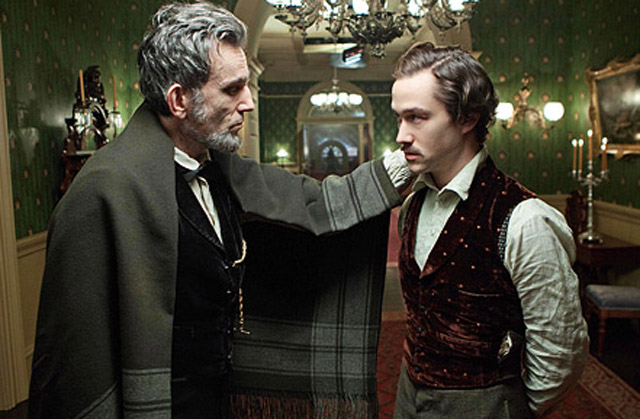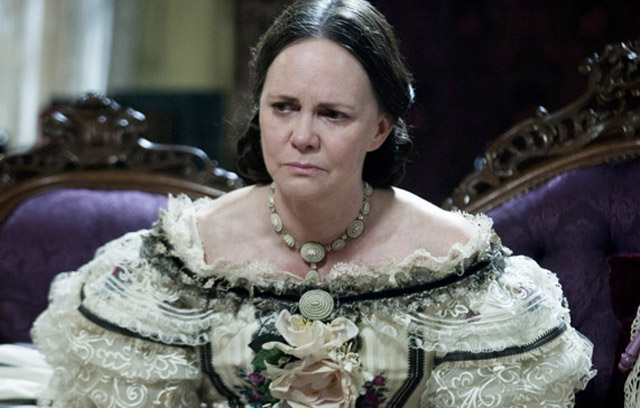CHICAGO – Patrick McDonald of HollywoodChicago.com appears on “The Morning Mess” with Dan Baker on WBGR-FM (Monroe, Wisconsin) on March 21st, 2024, reviewing the new streaming series “Manhunt” – based on the bestseller by James L. Swanson – currently streaming on Apple TV+.
‘Lincoln’ Magnificently Humanizes the Man, Our History
 Rating: 5.0/5.0 |
CHICAGO – There is an argument that Steven Spielberg is the most “American” of directors, at least in his generation. He deftly and brilliantly teams up with playwright Tony Kushner and actor Daniel Day-Lewis to humanize and realize our 16th president in “Lincoln.”
By focusing on a single month in Abraham Lincoln’s tumultuous administration, at a tipping point in both American history and the Civil War, “Lincoln” boldly brings to life an era that in previous incarnations – both in textbooks and movies – has been portrayed as starchy and formal. In this presentation, Abraham Lincoln is a living, breathing flesh-and-blood man, with an uncanny ability to make the right decisions at a time when the right decisions are desperately necessary. The process of his strategy for passing a very political piece of legislation is fascinating to experience, and with every supporting actor – plus a career defining performance by Sally Field as Mary Todd Lincoln – the film is a reverential tribute to this country’s greatest president.
It is January in the new year of 1865, and the Civil War is winding down. Abraham Lincoln (Daniel Day-Lewis) had signed an executive order in 1863 called the Emancipation Proclamation, in essence freeing the African-American slaves. But what is necessary to make it law is a constitutional amendment. Lincoln knows he can never get the reconstructed South to go along, so if he could push the amendment through a 2/3rds majority in Congress, he could both get the Proclamation as law and hasten the end of the war.
 Photo credit: Touchstones Pictures |
This tricky balancing act is in the background of the day-to-day war activities, Lincoln’s family which includes wife Mary (Sally Field), and a cabinet that has been described as a “team of rivals.” Like any piece of political legislation, there needs to be “lobbyists,” and Lincoln authorizes three scalawags (precisely portrayed by James Spader, John Hawkes and Tim Blake Nelson) to cajole, bribe and influence undecided members of Congress. In the meantime Lincoln’s son Robert (Joseph Gordon-Levitt) is pining to enlist in the war, adding more pressure to an explosive situation for the Great Emancipator.
The decision to focus on one crucial month, in the overall scheme of the four year war, was essential to tell the story of the man. In a virtual day-by-day calendar, the machinations of passing the 13th Amendment to the law of the land examines the tedium and excitement at the same time. And in that everyday context, an Abraham Lincoln is revealed to be a concerned family man, giving undue attention at times to his younger son Tad, sadly worrying over his wife’s delicate sanity and breaking the tension with a series of weirdly funny stories. Add the delicate and subtle performance of Lewis, and the man is alive again.
The script is talky, given that it is from playwright Tony Kushner (“Angels in America”), but it’s also a captivating history lesson. The mechanics of politics are somewhat dirty and clunky, and there is compromise from stanch abolitionists like Thaddeus Stevens (Tommy Lee Jones) and Confederate emissaries who are part of the peace negotiations. Attention must be paid, but this is compelling and vivacious American experience culture at work, and like all society-changing law, it takes place at the edge of a cliff.
All the performances are vital and sincere, but the most surprising comes in the presence of Sally Field as Mary Todd Lincoln. In three or four very brief but spirited scenes, she evokes everything that is thought of Mary Todd, including the madness. But there also a notion that Mrs. L was a woman ahead of her time, quick of wit and not one to suffer fools. Tommy Lee Jones as Thaddeus Stevens performs his usual statuesque bearing, becoming the centerpiece of the fight and its most glorious compatriot.
 Photo credit: Touchstones Pictures |
But nothing would have worked without Daniel Day-Lewis, virtually in every scene as Lincoln. It’s the regal nature of the country boy from Kentucky that is born from a combination of his ambition, intelligence and life experience. It is all wrapped into the persona that Lewis developed, yet another Oscar worthy role that redefines the real Abraham through the actor.
The second inauguration address (March, 1865) is highlighted toward the end of the film, a clarion call that still packs an emotional response. The events of “Lincoln” makes those words even more powerful and scripture-like, “With malice towards none; with charity for all; with firmness in the right, as God gives us to see the right…”
 | By PATRICK McDONALD |


